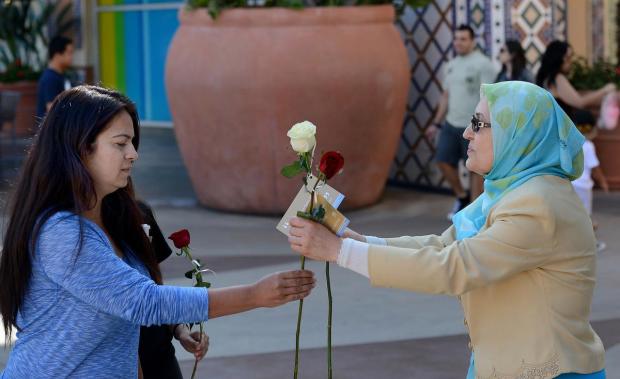
Like many Muslim women, I have lots of scarves. I have rectangular wisps of fabric in muted pastels, geometric-patterned squares in neutral shades and lengths of floral chiffon. I used to wear these daily. Now, they’re reserved for that special occasion known as “When I’m in the Mood.”
When I stopped covering my head daily, I gave about half my scarves away. Of the ones I kept, they remain not because they remind me of happy times, but because they remind me of key moments in my struggle to deter the objectification of my own body. It’s a war women fight the world over, with serious economic and social consequences.
This war begins early. The surprise attacks come years before a girl puts on her first real bra or her own high heels. For me, being told that I was immodestly dressed at age seven was the opening salvo. There’s no way to negotiate a cease-fire. I couldn’t bring my opponents to the table and ask why my tiny, thin body had to be policed in this way. I lost the delight of a late summer’s breeze on my limbs in that battle.
Talking with others as an adult, I would learn that this is about the age when some lose the chance to best the neighborhood boys in foot races, the freedom to climb trees, or engage in any activity that would be hindered by an abaya. But no matter what we lost, the face of the opposition was always female.
No strange man came to hound us into lengths of polyester. It was sometimes an aunt or a grandmother. But usually, it was our own mothers who thrust us into a battle we were never prepared to fight.
As the war rages on, we are offered a very limited range of tactics. We must dress modestly, but not too drably. We must develop the right sort of figure, lest our too-generous curves label us as unchaste, ignorant and impious. Hair that fails to be straight or skin that refuses to be pale can render a woman beyond hope of a corner office, a husband, or Jannah.
We’re taught that we must police the appearance of other women and girls, but not in such a way that suggests that we hold real power. We’re expected to punish other women for things that may not be remotely under their own control, to direct objectification and violence away from ourselves. When we do this, we’re sending the message that someone else is an acceptable target. But we’re all someone else to someone else.
We lose because we are given tools that aren’t designed for victory, but deflection.
When we kick girls out of class for wearing short skirts, we’re communicating that the most important lesson offered in class is that this girl’s body shouldn’t be seen. We alienate girls from an environment designed to nurture their minds to exert control over their bodies. When we judge young women for wearing tight clothes and headscarves, we’re sending the message that their expressions of identity matter less than the fact that we might be able to see their form.
We create societies designed to pit girls and women against their own bodies. This is a fight that has yet to prevent harassment or violence, yet the demand for girls and women to be less visible ring from mimbar to pamphlet to kitchen table.
Wear more. Be paler and shorter if you can. Speak less. And, when you are harassed or assaulted anyway, never stop looking for ways to blame yourself. It’s a fight that alienates girls from religion and squanders the talents of half of humanity on a fool’s errand.
Women and girls cannot win this war fighting alone. We may confront our parents, teachers or religious instructors personally, but the tradition of punishing girls and women for crimes against us is too well entrenched for a solo direct assault to work.
When we’re young, we’re accused of lacking experience with the world of men. When we’re older, we’re accused of being out of touch with younger men today. Systemic oppression gets repainted as aberration. We cannot win the war for our bodies from inside our own. We must defend each other to defend ourselves.
When a bareheaded woman defends the right of other women to wear niqab (face veil), the accusations of being too backwards, hidden or pious to function in society take a hit. When women defend girls against biased school dress codes, it’s harder to dismiss the criticism as coming from a bunch of silly teens.
Non-Black women are more likely to be listened to when the discussion turns to portraying Black women as inherently less modest or pious. When a woman who wears jilbab (type of a headscarf) stands covered shoulder to bare shoulder with her sisters in humanity, she’s no longer saying, “not me, hurt her instead.” She’s saying, “not her, not me, not anybody else, ever again.” The war for our bodies needs an army.
One of the scarves in my closet is a white square with tone-on-tone embroidery. It straddles that line between “frilly” and “frumpy” rather neatly. I was wearing it when a random Muslim woman in an abaya came up to me to chat. We greeted one another, exchanged information about who we might have known in common, and what she said next chills me to this day.
She praised me for wearing a jilbab and expressed disdain for those who did not. She then sighed her disappointment that my jilbab was lavender instead of black. I don’t know if I would have defended the many women who don’t wear jilbab if she hadn’t expressed disdain for mine. I do know that I strove to make her understand that I would not stand against my sisters, and that I would defend their right to wear what worked for them.
Girls and women are taught to look after others, and this can make it easier for us to stand up for others where we would be silent for ourselves. Practically from birth, girls are obliged to deal with objectification as lone soldiers in a war we did not seek. We need allies. And what better allies could we have than each other?
Nakia Jackson is a mom, musician and writer. From her first (terrible) story at age six to the ad copy and background music she sells to keep the family in yarn and Cheerios, creating has been her life’s breath. When not creating, Nakia enjoys family excursions designed to show the world that normal is merely a setting on the washing machine. Her column, Another Kind of Voice, is published in the last week of every month.












